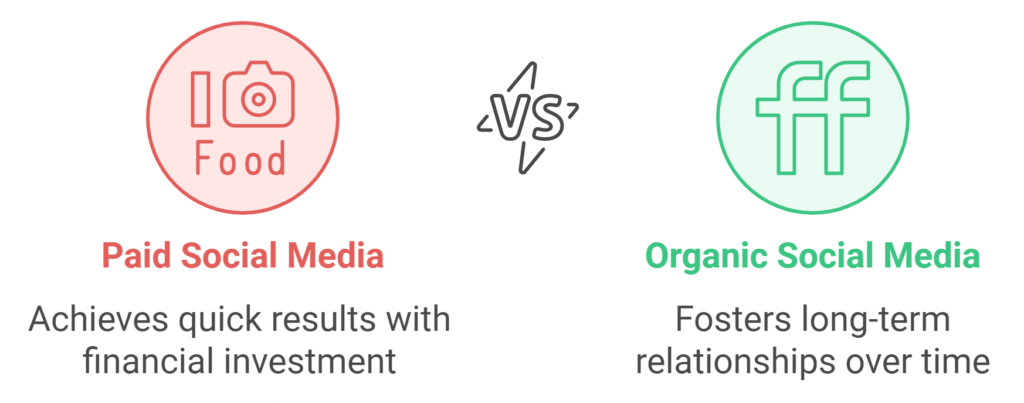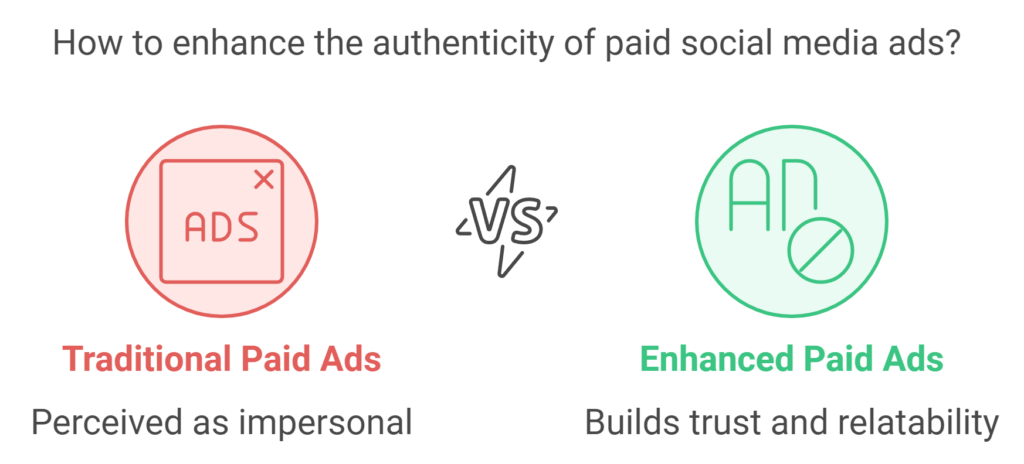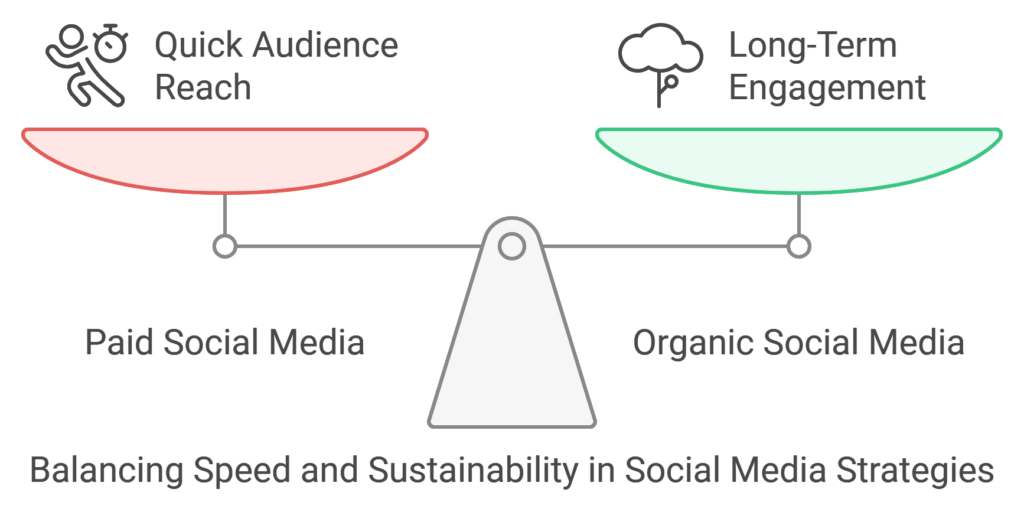
Paid vs. Organic Social Media Marketing: A Simple Guide to Choosing the Right Strategy
Choosing between paid and organic social media marketing can be tricky. This article explains the differences, benefits, and how to combine them for the best results.
Key Takeaways:
- Paid social media gets you fast results but costs money.
- Organic social media builds relationships but takes time.
- Combining both is often the best way to go.

Paid vs. Organic Social Media: What’s the Difference?
Think of it like this: paid social media is like renting a billboard, while organic social media is like building a community garden. Paid social media gets your message out quickly to a large, targeted audience. Organic social media, on the other hand, focuses on building relationships and engaging with your followers over time. Both have their place in a successful social media strategy. Which one is right for you depends on your goals, budget, and available time.
Defining Paid Social Media Marketing
Paid social media involves paying platforms like Facebook, Instagram, and Twitter to show your ads to a specific audience. You can target people based on their interests, demographics, and even their online behavior.
Benefits of Paid Social Media for Fast Growth
Want to boost your visibility quickly? Paid social media is your answer. It’s like a fast-track to reaching new customers and driving traffic to your website. You can see results almost immediately, making it ideal for product launches, promotions, and time-sensitive campaigns.
Choosing the Right Paid Social Media Platforms
Not all social media platforms are created equal. Where your target audience hangs out should determine where you spend your ad dollars. Are you targeting professionals? LinkedIn might be your best bet. Targeting younger audiences? TikTok or Instagram could be more effective.
Authenticity in Paid Ads: Bridging the Trust Gap
Sometimes, paid ads can feel a little… impersonal. To make them feel more genuine, try incorporating user-generated content or real customer testimonials. This can help build trust and make your ads more relatable.

Defining Organic Social Media Marketing
Organic social media marketing is all about building a community around your brand. It involves creating and sharing valuable content, engaging with your followers, and fostering authentic relationships.
Long-Term Advantages of Organic Engagement
Building a strong organic presence takes time, but the payoff can be huge. A loyal community can become your biggest advocates, spreading the word about your brand and driving long-term growth. Think of it as planting seeds that will eventually blossom into a thriving garden.
Strategies for Building an Authentic and Engaged Community
How do you build a thriving online community? By being authentic, engaging, and providing value to your followers. Ask questions, respond to comments, and share content that resonates with your target audience.
Measuring Organic Social Media Success: Key Metrics and Tools
Measuring the success of organic social media can be tricky. While paid social media offers clear metrics like clicks and conversions, organic success is often measured by engagement metrics like likes, comments, and shares. Tools like Google Analytics can help you track these metrics and understand what’s working.
Content Quality for Organic Reach: Essential Considerations
High-quality content is the lifeblood of organic social media. Invest in creating engaging, informative, and visually appealing content that will capture your audience’s attention and keep them coming back for more.
Integrating Paid and Organic Social Media: A Hybrid Approach
Why choose between paid and organic when you can have both? A hybrid approach leverages the strengths of each strategy for maximum impact.
Creating a Seamless Hybrid Strategy for Maximum Impact
A hybrid strategy might involve using paid ads to amplify your organic reach or using organic content to build trust and engagement with your paid audience. It’s all about finding the right balance for your business.
Case Studies of Successful Hybrid Social Media Campaigns
Many businesses have seen great success with hybrid social media strategies. Researching these case studies can provide valuable insights and inspiration for your own campaigns.
Hybrid Strategy for Small Businesses: A Cost-Effective Solution
For small businesses with limited budgets, a hybrid approach can be a game-changer. It allows them to reach a wider audience without breaking the bank.
Influencer Marketing Considerations for Organic Social Media
Partnering with influencers can be a powerful way to boost your organic reach and build credibility. Influencers can introduce your brand to a new audience and generate buzz around your products or services.
Navigating Algorithmic Changes for Continued Organic Reach
Social media algorithms are constantly changing, which can impact your organic reach. Staying up-to-date on these changes and adapting your strategy accordingly is crucial for maintaining visibility.
Measuring the Effectiveness of Your Social Media Strategy
Key Performance Indicators (KPIs) for Paid and Organic Efforts
Whether you’re focusing on paid, organic, or a hybrid approach, tracking the right KPIs is essential for measuring your success. These might include website traffic, engagement rates, conversions, and brand mentions.
Tools for Analyzing Social Media Success
Several tools can help you analyze your social media performance, including Google Analytics, SproutSocial, and Hootsuite. These tools can provide valuable insights into what’s working and what’s not.
Future Trends in Paid and Organic Social Media Marketing
The Role of AI in Automating Social Media Campaigns
AI is playing an increasingly important role in social media marketing, automating tasks like scheduling posts and targeting ads.
Predicted Shifts in Social Media Platform Algorithms
Social media platforms are constantly evolving, and their algorithms are likely to continue changing in the future. Staying informed about these changes will be crucial for maintaining a successful social media presence.
Choosing the Right Social Media Strategy for Your Business Goals
The best social media strategy for your business depends on your specific goals and resources. Do you want to drive sales, build brand awareness, or foster community engagement? Your goals will determine which approach is right for you. Check out more information on paid vs organic social media marketing.
Paid Social Media for Niche Audiences: Maximizing Reach and Impact
Paid social media can be incredibly effective for reaching niche audiences. By using precise targeting options, you can ensure your ads are seen by the right people.
Impact of Ad Fatigue: Balancing Paid Ads with Organic Content
Too many ads can lead to ad fatigue, where your audience starts tuning them out. Balancing paid ads with engaging organic content can help mitigate this issue.
Long-Term ROI of Organic Social Media: Building a Loyal Community
While organic social media takes time to build, it can generate a significant long-term ROI by fostering a loyal community that advocates for your brand.

Conclusion
Paid and organic social media marketing each offer unique benefits. By understanding the differences and choosing the right strategy for your business, you can achieve your social media goals and build a thriving online presence.

